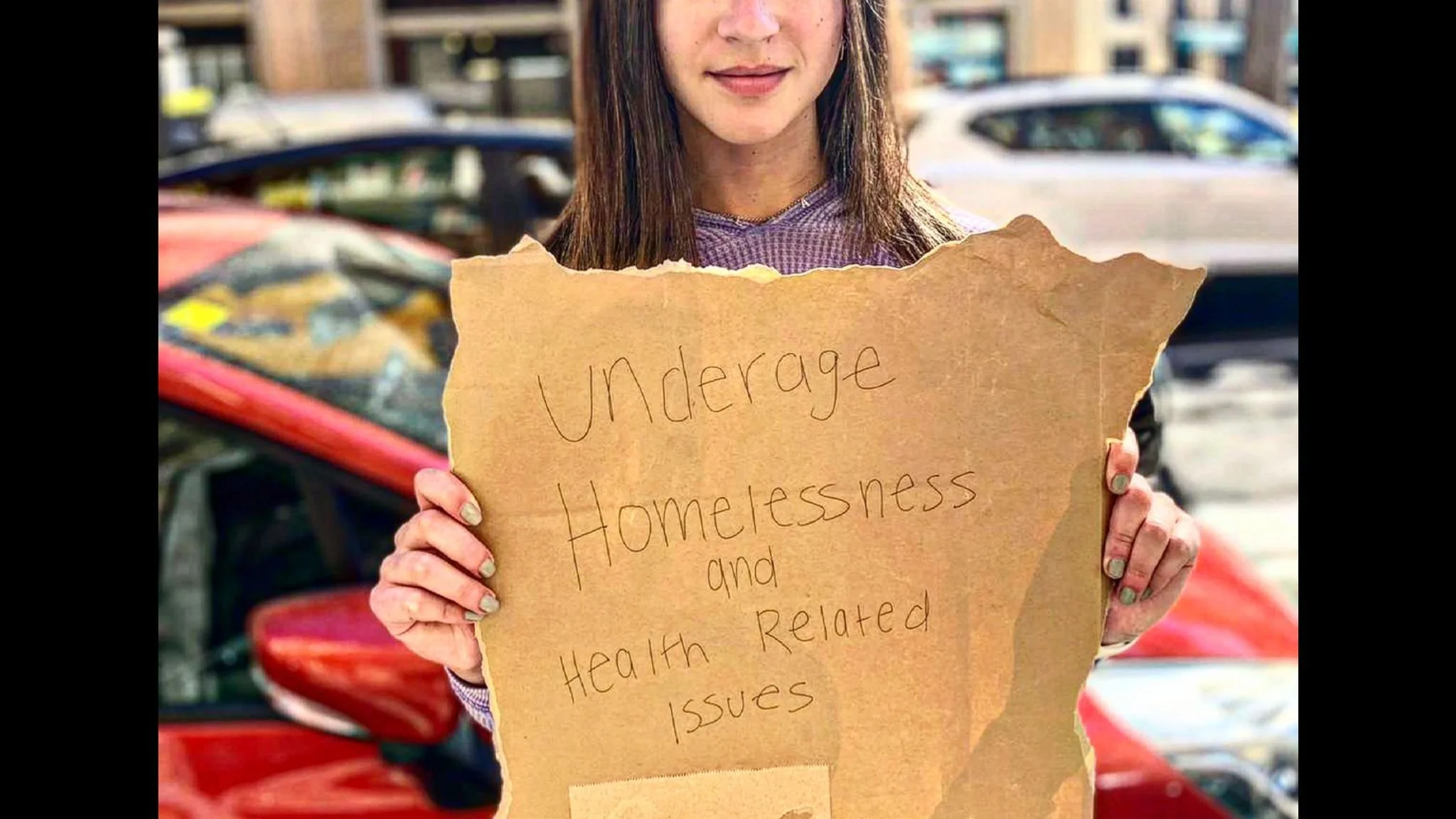Written by Julia Marvy
Homelessness is a global problem and affects people in every country. There are far too many people living in poverty, an estimated 154 million in the world, according to Habitat for Humanity. Of that homeless population, about forty percent of those people are under the age of eighteen. Living on the streets and not having a stable income makes it very difficult for these individuals to receive health care that is necessary. Among those living in poverty there are a variety of health related concerns, ranging from physical, mental, and emotional. Health care access is hard to come by for the homeless population due to a lack of availability of resources. The homeless population does not have a stable income, therefore making it impossible for them to afford health care without assistance, and there is not much assistance readily available.
“An underage person experiencing homelessness fell in a hole and couldn’t get out. A businessman went by. The underaged homeless person called out for help. The businessman threw him some money and told him to buy a ladder, but the underaged homeless person could not find a ladder in the hole he was in. A doctor walked by. The underaged homeless person said, ‘Help, I can’t get out.’ The doctor gave him some drugs and said, ‘Take this, it will relieve the pain.’ The underaged homeless person said thanks, but when the pills ran out, he was still in the hole. A renowned psychiatrist rode by and heard the underaged homeless person’s cry for help. She stopped and said, ‘How did you get in there? Tell me about yourself, it will alleviate your sense of loneliness.’ So the underaged homeless person talked with her for an hour, then the psychiatrist had to leave, but she said he’d be back next week. The underaged homeless person thanked her, but was still in his hole. A priest came by and heard the underaged homeless person calling for help. The priest gave him a Bible and said, ‘I’ll pray for you.’ The priest got down on his knees and prayed for the underaged homeless person, then left. The underaged homeless person was very grateful and he read the whole Bible, but he was still stuck in that hole. A Homeless Entrepreneur happened to be passing by. The underaged homeless person cried out, ‘Hey, help me, I’m stuck in this hole!’ Right away, the Homeless Entrepreneur jumped into the hole with him. The underaged homeless person said, ‘What are you doing? Now we’re both stuck in here.’ The Homeless Entrepreneur responded, ‘It’s ok, I’ve been here before and know the way out.”
Homeless Entrepreneur is an organization in various parts of the world that works with homeless people who want to get back on their feet and have their eyes set on succeeding. The overarching goal of Homeless Entrepreneur is to work towards ending homelessness and poverty, while developing success and bettering the lives of those living in poverty. Within this organization, there are different branches to address several issues regarding homelessness and finding ways to help the Homeless Entrepreneurs (HEs) succeed in their goals. This organization helps get the HEs employment opportunities and provides them with housing and support. Homeless Entrepreneur really wants to reduce homelessness and does what it takes to help each individual that joins the program. Regardless of age, gender, race, ethnicity, etc, this organization is open to helping anybody who is willing and able to participate in its program. Not only does the organization help HEs get employment opportunities, they also help them to grow their community and networks in various areas of life. For example, there is a health department that works to determine what is needed to reduce homelessness in terms of health. Those living in poverty do not have the same access to health care and therefore have more health related problems. The health department of Homeless Entrepreneur works to gain health care resources to help improve the overall quality of life and well being of the entrepreneurs.
Regarding homelessness among the youth population, there is not much known in comparison to the overarching term homelessness. Living without a home is extremely detrimental to the health and wellness of adolescents. There are several health related concerns for the homeless youth population, but health care workers are limited in their capabilities to help these individuals. Many homeless youth do not seek out health care when they need it due to the fear of being judged. There are beliefs among the homeless youth that healthcare professionals have negative attitudes toward the homeless, which insinuates fear and not seeking the help when it is needed. Health care workers need to become more aware of this and try to provide the resources they are able to in a more open manner. There is a misconception around the world that homeless teenagers are on the street by choice. That is not the case; many youths are on the streets for several different reasons. Sexual abuse, violence, refugees, and unstable living environments are just a few of the possible causes of youth homelessness.
The well-being of homeless youth is considerably worse than those who are not homeless. They have a greater chance of more severe and damaging mental health problems. Depression, anxiety, and post traumatic stress disorder are very common among the homeless youth and these individuals have a greater chance of developing these disorders more severely compared to their peers. Nearly half of the homeless youth population has been diagnosed with a mood disorder when they are able to seek medical care. Mental health is very important in terms of living a healthy lifestyle, and without the proper care, many other problems could arise. Millions of people have a mental illness, but not all of those people are able to get the necessary help. Those living in social exclusion do not necessarily have the ability to get proper treatment for their mental health, and that alone is extremely detrimental. It is very common for adolescents to have a mental health disorder, and without the proper care bigger and more severe problems will occur. The homeless youth need the resources for their mental health in order to attempt any sort of healthy lifestyle.
Please tell us a story about a challenge you’ve faced due to mental health issues and how you overcame it, so we can learn more about possible solutions to help people experiencing homelessness in our programs.
In a more physical health outlook, homeless youth have an increased rate of acute and chronic respiratory problems. Many homeless youth also find themselves having sex with several people in order to make money. The term “survival sex” is used and it essentially refers to homeless youth selling themselves for sex as a way to help them survive. These behaviors often lead to the development of sexually transmitted diseases, the most common being HIV. Due to their lack of healthcare access, these STDs may not be discovered or treated properly, which can ultimately lead to more health issues. Another point is elevated drug use among the homeless youth population. Drug use can lead to several other health issues. Homeless youth are more prone to drug use.
In conversation with a 21 year old female college student attending Miami University in Oxford, OH, Lexi opened up regarding her struggles with mental health. She talked about constant feelings of distress, panic attacks, and too much worrying. These feelings started to affect all aspects of her life. She never wanted to leave her room because she was too worried that she would have a panic attack or something would trigger her. These feelings affected her relationships with friends and family, her drive to succeed in school, her motivation to exercise, and it led to a decreased appetite. After coming to terms with how severe her feelings truly were, Lexi spoke with her parents and was able to connect with a therapist.
“Since starting therapy, Lexi highlights that she feels more confident and mentioned that she no longer feels a weight on her back. She feels more free and comfortable in her own skin to go out and do what she normally does. She also was able to connect with a psychiatrist, who diagnosed her with generalized anxiety disorder and prescribed her medication. Lexi is someone who is incredibly fortunate to have the ability and resources to seek out the help she needs.”
She knew she was struggling, and it really was impacting every part of her life, so she was able to get the help and treatments she needed. The youth that are living in social exclusion do not have it this easy. They have to deal with these same feelings that Lexi felt every single day, but do not get to talk to a therapist about them or take medication to help tame them. Lexi noted that her mental health is very important and having those off feelings did not allow her to feel healthy. Since getting help and medication, Lexi feels that she is back on track and on her way back to a fully healthy lifestyle. The homeless youth deserve the same resources as Lexi and the millions of other people that struggle with mental health, but due to their circumstances they do not have these resources. Mental health struggles do not amount to a healthy lifestyle, and every person, regardless of any other factors, deserves a healthy lifestyle and the proper care when needed.
Those living in social exclusion who need access to health care are unable to get it in some instances. Hoshang, a Homeless Entrepreneur, spoke on behalf of a young boy regarding access to health care. There is a young boy, Antonio, who is almost seven years old living in social exclusion. He needs a health card in order to receive health care in Spain, however without a passport and money, he is unable to do so. If an emergency happens, he would not be able to receive the care he needs, due to the fact that he does not have the ability to get a new health card. Without health care, Antonio as well as so many others will suffer tremendously. Without having this health card, people feel helpless and uneasy on where to go and what to do. No one should have to suffer through physical or mental health problems, especially such a young boy.
Arantxa Ruiz Ponce is part of the organization Feliz No Cumpleaños, which helps adolescents living in social exclusion. She spoke about her mental health and how important it is to have stability when it comes to mental health. She talked about being very familiar with depression and anxiety, which are the two most common mental health illnesses. She said that with therapy and treatment, she was able to overcome her struggles. The help of psychologists and private practice helped her get back on her feet. Without the ability to get help, these problems could have worsened significantly. There are so many adolescents living in social exclusion that are dealing with these exact problems, yet do not have the resources to get help from a psychologist or private practice.
References
Haldenby, A. M., Berman, H., & Forchuk, C. (2007). Homelessness and health in adolescents.
Qual Health Res, 17(1232). https://doi.org/10.1177/1049732307307550
Perlman, S., Willard, J., Herbers, J. E., Cutuli, J. J., & Garg Eyrich, K. M. (2014). Youth
homelessness: Prevalence and mental health correlates. UChicago Journals, 361-374.
https://www.journals.uchicago.edu/doi/pdf/10.1086/677757



